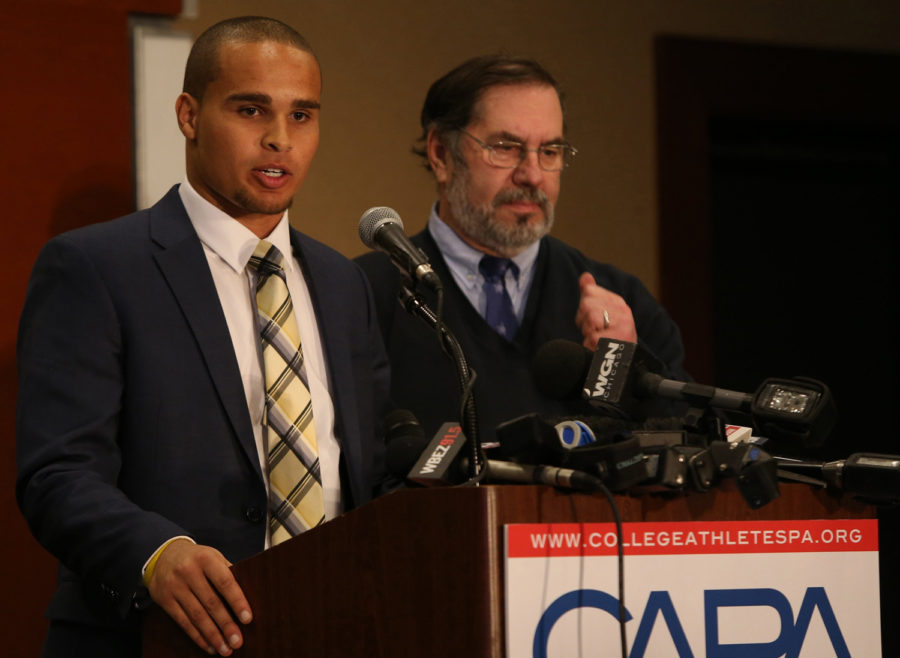Column: Universities should recognize student athletes as employees
Antonio Perez/Chicago Tribune/MCT
Kain Colter, a then-quarterback and then-receiver for Northwestern University, gestures toward United Steelworkers International president Leo Gerard as he answers questions following the announcement that several Northwestern football players wish to join a labor union, during a press conference in Chicago on Jan. 28, 2014.
September 12, 2018
Football players at Northwestern University requested to unionize in January 2014 — an unprecedented request. After weeks of deliberation, the National Labor Relation Board granted the players’ request that March. A little over a year later, the same board that first ruled in the players’ favor overturned its initial decision.
Since that case, a few similar court cases have followed — none successful — and national progress on the issue has stalled. Yet debate continues to rage throughout the country about whether student-athletes are considered university employees.
Universities should recognize athletes as student employees. This would mitigate exploitation of the athletes, minimizing the overtime hours they put in and limiting the control that coaches and universities have over athletes’ personal lives.
Kain Colter, Northwestern’s quarterback at the height of the request, initially approached the College Athletes Players Association and presented arguments in favor of recognition as employees, including the revenue the athletes generate, the time they spend at practice and the control the university has over their lives.
One main reason athletes want to be university employees is so they get the same perks that employees get. This includes quality medical care, something that Colter emphasized.
“I sacrificed my body for four years,” he said. “They sold my jersey in the stores and they should protect me as far as medical coverage.”
More importantly, this can include the right to be represented by a union. As university employees working under a union, student-athletes could negotiate hours, benefits and pay.
Though no student-athletes have ever successfully formed a union, similar cases occur in the academic sphere all the time. Graduate students at Penn State held a union election earlier this year, and graduate students at Pitt are pursuing something similar — they filed to hold a union election in December 2017, something the University has aggressively fought back against.
Athletes would benefit from this unionization, but giving athletes more control over their hours is especially important. On average, student-athletes practice — work — more than 30 hours per week, with more time-demanding sports like football or basketball topping 40 hours per week. An essentially full-time job outside of class leaves little time to focus on homework and exams.
Student-athletes should be students first and athletes second — after all, they attend universities to get a degree, and most do not go pro. Only 1.6 percent of NCAA football players enter the NFL and only 0.9 percent of women’s basketball players enter the WNBA. A solid education is vital to ensure student-athletes’ future successes.
In addition to minimal control over their hours, student-athletes have little control over their personal lives. At Northwestern, football players have to seek approval from coaches before they can sign a lease, drive a car, post online or even leave campus. This lack of autonomy in adult students is unacceptable, especially since they have little choice in deciding these terms.
Controversially, this would also grant a large number of students the right to negotiate their pay. Currently, top student-athletes can obtain scholarships that cover the full cost of tuition, room and board, but many other athletes — particularly in less-watched sports — do not receive the same compensation.
It’s not just an issue of money — this debate is also divided along racial lines. While more than 50 percent of black Americans support paying college students, only 27 percent of their white counterparts feel the same. And given that a high percentage of student-athletes are black, it’s difficult to ignore that a race factor may influence beliefs toward student-athletes.
After the Northwestern case, the NCAA changed its policy and began awarding stipends to players to cover any expenses that scholarships did not. This stipend scales with the cost of the school, with the highest stipend coming from the University of Cincinnati at $6,082. The lowest known stipend is $2,500 at University of Tulsa.
But some don’t think this goes far enough. Many who support paying student-athletes cite the players’ market value, the revenue and capital associated with their name and brand. A nationally renowned player, like former Pitt running back James Conner, brings in extremely high revenue from sponsors, ticket sales and memorabilia — top-level Division I players bring in an average of $163,087 per year. Critics of the current policy argue that athletes should get a portion of their market value, which is the increased revenue they bring to their universities.
Some may argue that recognizing athletes as university employees would give them undue benefits that go beyond the privileges they already have. At Pitt, for example, athletes get early registration, special one-on-one tutoring and nearly 24/7 access to top athletic facilities and medical care.
But just because student-athletes currently get these privileges does not mean that students gifted in other areas, such as academics, should not. Undergraduate students who produce excellent research are recognized nationally with publications and accolades, yet they don’t benefit outside of this recognition. These students should get analogous benefits — they could definitely benefit from getting into classes early.
More than that, the revenue student-athletes bring to their universities is significantly larger than the revenue the average student brings, so it only makes sense to compensate student-athletes appropriately.
In the end, paying athletes is unavoidable if we want to treat athletes fairly. Recognizing them as employees is the best solution in giving them more control over their lives, regardless of a change in pay policy.
Universities across the country need to recognize the significant contributions that student-athletes make to their universities and recognize them as employees accordingly. It’s only fair to grant them basic autonomy over their lives.



